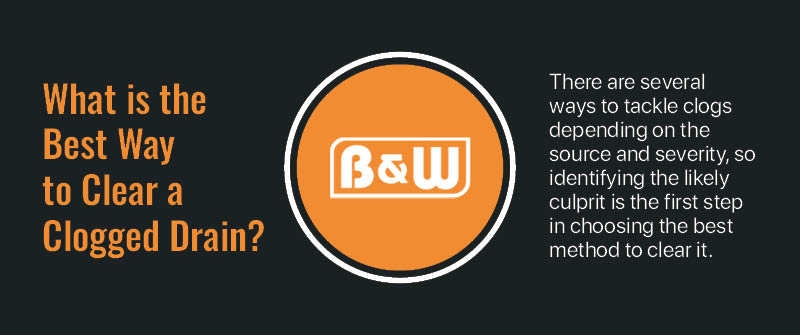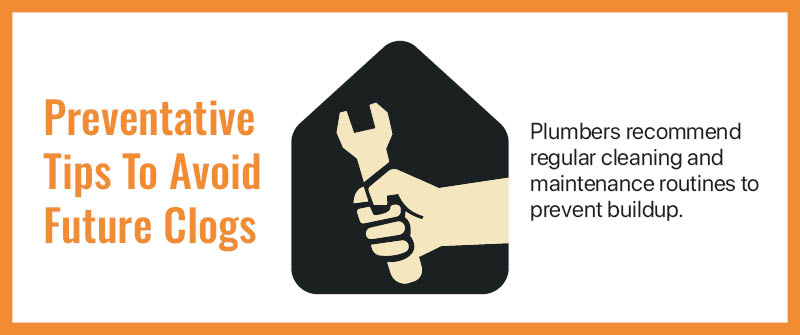What Is the Best Way to Clear a Clogged Drain?
How Do You Unclog a Severely Clogged Drain?
Dealing with a severely clogged drain often requires more than simple home remedies. Severely blocked drains can be caused by a buildup of grease, soap residue, hair, or even foreign objects lodged deep in the pipes. If left untreated, these clogs can lead to water damage and costly repairs. But with the right tools and techniques, even the toughest clogs can be tackled effectively. In many cases, plumbing services are essential to clean you drain and prevent further plumbing issues.
What is the Best Way to Clear a Clogged Drain? Understanding the Severity and Causes of Clogs
The first step in clearing a clogged drain is understanding what might be causing the problem. Kitchen sinks often suffer from clogs due to food particles and oil buildup, with pouring fats, oils, and grease down the drain being a common cause. Bathroom drains are commonly clogged with hair and soap scum, and how much buildup there is can significantly impact draining. Tubs and toilets are also common sources of clogs, each with their own typical causes, such as hair and soap in the tub or flushing inappropriate items in the toilet. Clogs can cause water to move back up and prevent proper draining, making it important to address them promptly. There are several ways to tackle clogs depending on the source and severity, so identifying the likely culprit is the first step in choosing the best method to clear it.

Tools Needed for Unclogging Severe Clogs
To deal with clogged drains deep in the pipe, having the right tools on hand is essential. Before working under a sink or opening the P-trap, always place a bucket underneath to catch any water or debris. A plumber’s auger, or snake, is an indispensable tool for reaching clogs deep within the pipes. Additionally, a wet/dry vacuum can be employed to suck out the clog if it’s near the drain opening—be sure to ensure a tight seal over the drain to maximize suction. These tools are often more effective than store-bought liquid drain cleaners for severe clogs.
In some cases, you may need to remove the P-trap or other components to access the clog and pull out any debris or blockages that are accessible.
Steps to Manually Clear the Drain Using Specialized Tools
Begin by removing any visible debris from the surface of the drain, as clearing out what you can see is an important first step to unclog the drain. Insert the plumber’s snake into the drain, turning the handle clockwise to break through the clog. These methods work well for clearing stubborn clogs and can help restore proper flow. If using a wet/dry vacuum, set it to ‘wet’ mode and cover the drain tightly with the vacuum hose to generate the necessary suction. For stubborn clogs, combining mechanical methods with safe enzymatic cleaners can help break down the blockage over time.
After using enzymatic cleaners, pour a cup of baking soda down the drain, followed by vinegar. Let it sit for several minutes to allow the reaction to work on loosening the clog, then run hot water to flush the drain. You may need to repeat the process several times for a good result. Once finished, be sure to clean the area around the drain to remove any residue or debris.
Remember, if your efforts don’t resolve the issue, or if you’re unsure about tackling the problem yourself, the last resort is calling a professional plumber, like those from B&W Heating, Cooling, Plumbing, and Electric, to ensure a thorough and effective solution for even the most challenging clogs.
Do Baking Soda and Vinegar Work Better Than Drano?
When faced with a pesky clogged drain, many homeowners wonder if a natural solution like baking soda and vinegar could outperform commercial options like Drano. Both have their merits, but they work differently towards achieving the goal of a free-flowing drain.
Using baking soda and vinegar is a popular DIY method because it leverages a natural chemical reaction to clear clogs. The fizzing action can be effective in loosening minor blockages, especially for less severe clogs or as a preventive measure. An added bonus is that it’s safe for the environment and won’t corrode your pipes. However, its effectiveness is limited against tougher clogs caused by grease buildups or deep-seated blockages.
When To Use Commercial Drain Cleaners Like Drano
Drano and similar commercial drain cleaners are designed to tackle difficult clogs with powerful chemicals like sodium hydroxide. They can penetrate and break down grease, soap scum, and hair quickly, which might be beyond the capabilities of lighter remedies. However, these products need to be used cautiously, as they can be harsh on plumbing if used excessively. Following the manufacturer’s instructions is vital to prevent potential damage to pipes.
What Do Plumbers Recommend for Unclogging Drains?
From mechanical solutions to chemical applications, professional advice can guide you through safely and efficiently tackling your drainage dilemmas. Follow these expert tips to get your drains flowing again quickly and effectively.
Professional Mechanical and Chemical Solutions
One of the most common recommendations from plumbers involves using a professional-grade plunger or drain snake. These tools can access clogs deep within pipes, making them effective for stubborn blockages that basic household tools can’t reach. If these methods don’t work, plumbers might resort to hydro-jetting, a process involving high-pressure water streams to clear the pipes thoroughly.
On the chemical side, plumbers often suggest enzymatic drain cleaners over harsh chemical cleaners. Enzymatic cleaners, while taking a bit longer to work, use natural bacteria to break down organic matter, offering a safe and environmentally friendly solution. In cases where chemical intervention is necessary, plumbers may apply industrial-strength solutions that aren’t typically available to consumers.
Preventative Tips To Avoid Future Clogs
Prevention is always better than a cure, and with drains, this is no exception. Plumbers recommend regular cleaning and maintenance routines to prevent buildup. Installing mesh drain covers can catch hair and other larger particles before they cause a blockage. Moreover, being mindful of what goes down the drain—like avoiding grease, coffee grounds, and excessive food waste—can significantly reduce the likelihood of future clogs.
Importance of Regular Maintenance and Inspections
Homeowners are encouraged to conduct routine inspections and cleaning to maintain healthy pipe systems. Scheduling regular plumbing services and maintenance checks with a professional plumbing service, like B&W Heating, Cooling, Plumbing, and Electric, ensures that potential problems are spotted early. This proactive approach not only prevents major blockages but also extends the lifespan of your plumbing system, promoting better water flow and reducing the risk of costly repairs in the future.
Home Remedies for Common Clogs
There are few things more frustrating in a household than discovering a drain that refuses to clear. Luckily, there are a number of home remedies that can effectively tackle common clogs, often using items you already have on hand.
How to Clear a Clogged Drain With Standing Water
If you’re dealing with a clogged drain accompanied by standing water, start by using a simple method involving hot water. Carefully pour boiling water down the drain, as the heat can help to dissolve soap scum and loosen minor blockages.
What Is the Best Way to Clear a Clogged Shower Drain?
Hair is often the main culprit for a clogged drain in a shower. A mix of vinegar and baking soda can also be useful here. Another option is to use a wire coat hanger: straighten it out, leaving a small hook on the end, and carefully fish out hair clogs and debris. This can sometimes bring out large chunks that are causing the issue. Remember, taking it slow can help avoid any damage to the pipe.
Prevention is vital to keeping shower drain clogs at bay. Regularly using a hair catcher in your shower and avoiding disposing of fats or oils down your drains can keep your pipes flowing freely. These simple tools and measures can save you time and hassle in the future.
Final Thoughts
Want reliable solutions without the worry? Contact B&W Heating, Cooling, Plumbing, and Electrical and let us handle your plumbing needs. Our family-owned company has been ensuring comfortable homes in Central Indiana since 1961 with speedy service and no hidden fees. Enjoy the comfort and safety of an expertly maintained home.

